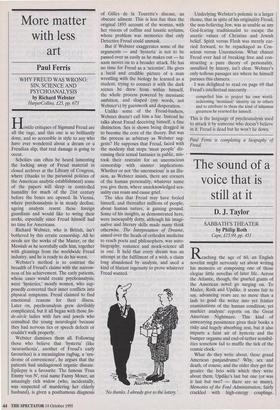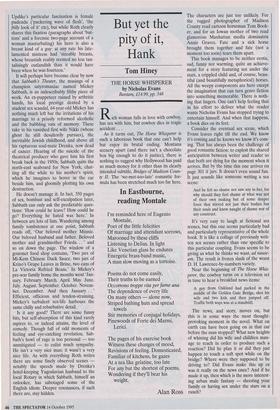The sound of a voice that is still at it
D. J. Taylor
SABBATH'S THEATER by Philip Roth Cape, 175.99, pp. 451 Reaching the age of 60, an English novelist might nervously set about writing his memoirs or composing one of those elegiac little novellas of later life. Across the Atlantic, though, the gnarled giants of the American novel go surging on. To Mailer, Roth and Updike, it seems fair to say, advancing years are no more than a lash to goad the writer into yet feistier examinations of the human condition, yet murkier analysts' reports on the Great American Nightmare. This kind of unwearying persistence gives their books a risky and hugely absorbing zest, but it also imparts a faint air of hysteria and the bumper orgasms and end-of-tether sensibil- ities somehow fail to muffle the tick of the cosmic clock.
What do they write about, these grand American panjandrums? Why, sex and death, of course, and the older they get the greater the brio with which they write about them. Updike's last but one (or was it last but two? — there are so many), Memories of the Ford Administration, fairly crackled with high-energy couplings. Updike's particular fascination is female pudenda (`puckering wave of flesh', 'the frilly look of it' etc), but while Roth clearly shares this fixation (paragraphs about 'but- tons' and a forensic two-page account of a woman masturbating) his hero is also a breast kind of a guy: at any rate his late- lamented mistress had 'sizeable breasts, whose breastish reality seemed no less tan- talisingly outlandish than it would have been when he was fourteen.'
It will perhaps have become clear by now that Sabbath's Theater, the musings of a champion satyromaniac named Mickey Sabbath, is an indescribably filthy piece of work. An ex-puppeteer ruined by arthritic hands, his local prestige dented by a student sex scandal, 64-year-old Mickey has nothing much left bar the irritations of his marriage to a prissily reformed alcoholic and the bubbling vats of memory. These take in his vanished first wife Nikki (whose ghost he still desultorily pursues), the inevitable Jewish childhood, and above all his rapturous soul-mate Drenka, now dead of cancer. Hearing of the suicide of the theatrical producer who gave him his first break back in the 1950s, Sabbath quits the north-east seaboard for New York, chat- ting all the while to his mother's spirit, which he imagines to hover in the car beside him, and gloomily plotting his own destruction.
He doesn't manage it. In fact, 350 pages of sex, bombast and self-exculpation later, Sabbath can only ask the predictable ques- tions: 'How could he leave? How could he go? Everything he hated was here.' In between are lots of lists. Wandering among family tombstones at one point, Sabbath reads off, 'Our beloved mother Minnie. Our beloved husband and father. Beloved mother and grandmother Frieda. . . ' and so on down the page. The window of a gourmet food shop contains, Two jars of Mi-Kern Chinese Duck Sauce, two jars of Krino's Grape Leaves in Brine, two cans of La Victoria Refried Beans.' In Mickey's pre-war family home the months went 'Jan- uary. February. March. April. May. June. July. August. September. October. Novem- ber. December. And then January... ' Efficient, officious and tendon-straining, Mickey's turbulent sex-life harbours the same chilly and rebarbative detail.
Is it any good? There are some funny bits, but self-absorption of this kind rarely aspires to, or indeed attains, the level of comedy. Though full of odd moments of feeling and eye-catching revelation, Sab- bath's howl of rage is too personal — too unmitigated — to enlist much sympathy. He isn't a very nice man; it wasn't a very nice life. As with everything Roth writes there are some finely observed scenes notably the speech made by Drenka's hotel-keeping Yugoslavian husband to the local Rotary in which Sabbath, himself an onlooker, has sabotaged some of the English idiom. Deeper resonances, if such there are, stay hidden.











































































 Previous page
Previous page